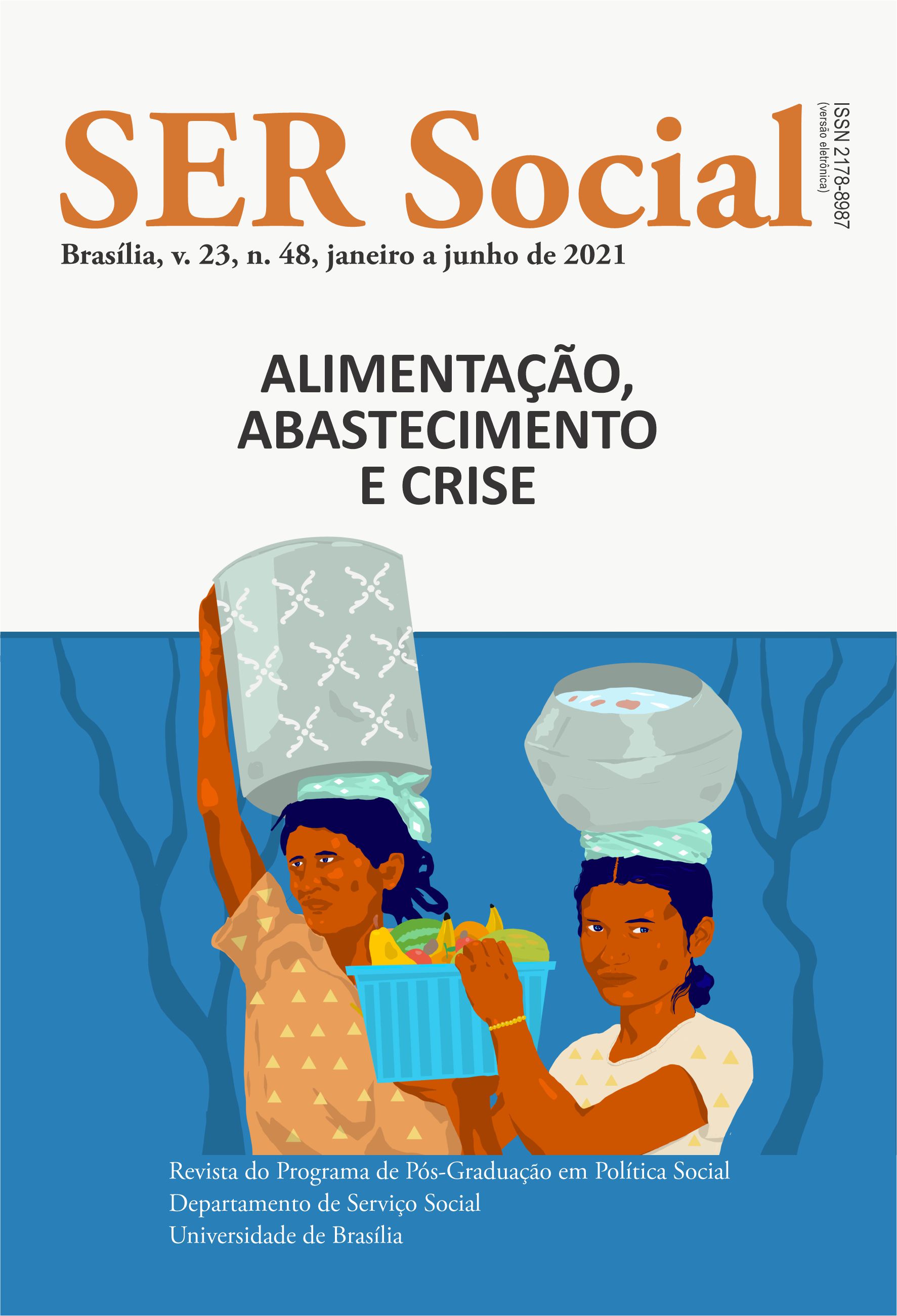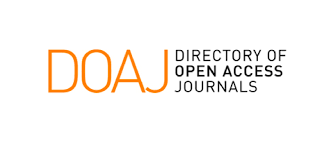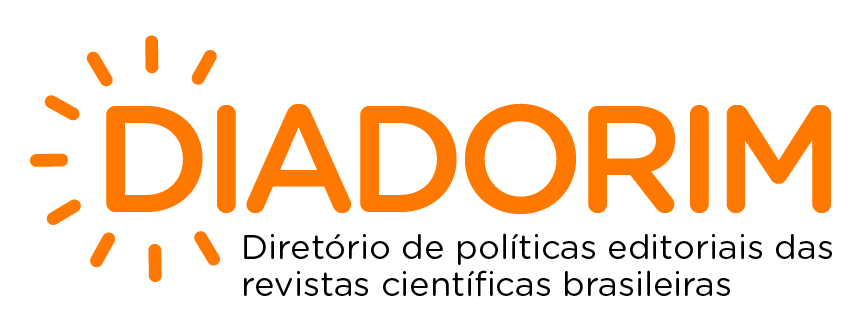The Daily Menu in Times of Pandemic for Individuals with Anxiety and Depression
DOI:
https://doi.org/10.26512/sersocial.v23i48.33812Keywords:
COVID-19. Depressive disorder. Anxiety disorders. Food and nutrition security. Eating habits.Abstract
The COVID-19 pandemic brought to light food and nutrition vulnerabilities in society, which were aggravated by the effects of social isolation and other measures to contain coronavirus spread in people’s lives. This study explores how individuals with mental disorders are reacting to this pandemic time, focusing in the context of their eating habits. For that, nineteen in-depth interviews were conducted with people previously diagnosed with depression and/or anxiety. We found out that the pandemic affected food and nutrition security for the participants, once it has acted as a trigger activating vulnerabilities that make this part of society more susceptible to negative changes in eating habits. They are consuming unhealthy food, and experiencing emotional eating and weight change. Also, financial problems, unemployment, and the rise of food prices were worsened by the pandemic, causing food access difficulties for few participants. Suggestions for policymakers were highlighted on the conclusion.
Downloads
References
ALCOFORADO, D. G. Depressão e Hábitos de Consumo: um Estudo Cross-Cultural entre Brasil e Alemanha. 2018. 171 pages. Thesis (Master in Business Management) - Universidade Federal de Pernambuco, 2018. Retrieved from https://repositorio.ufpe.br/handle/123456789/29977.
AOYAMA, M. et al. Insomnia and changes in alcohol consumption: Relation between possible complicated grief and depression among bereaved family caregivers. Journal of Affective Disorders, v. 275, p. 1”“6, 1 out. 2020.
BAKER, S. R. et al. How Does Household Spending Respond to an Epidemic? Consumption during the 2020 COVID-19 Pandemic. The Review of Asset Pricing Studies, 21 jul. 2020.
BELLOS, S. et al. Longitudinal association between different levels of alcohol consumption and a new onset of depression and generalized anxiety disorder: Results from an international study in primary care. Psychiatry Research, v. 243, p. 30”“34, 2016.
BRAUN, V.; CLARKE, V. Using thematic analysis in psychology. Qualitative Research in Psychology, 3:2, 77-101, 2006.
BRAZIL. Departamento de Atenção Básica, Secretaria de Atenção à Saúde, Ministério da Saúde. Guia Alimentar para a População Brasileira. 2ª Ed. Brasília: Ministério da Saúde; 2014.
BUBLITZ, M. G. et al. Pandemic Reveals Vulnerabilities in Food Access: Confronting Hunger Amidst a Crisis. Journal of Public Policy & Marketing (published online May 28, 2020), 2020.
CASTRO, B. L. G. DE et al. COVID-19 e organizações: estratégias de enfrentamento para redução de impactos. Revista Psicologia: Organizações e Trabalho, v. 20, n. 3, p. 1059”“1063, 2020.
CDC, CENTER. FOR DISEASE CONTROL AND PREVENTION. Mental Health and Coping During COVID-19 | CDC. Retrieved from: <https://www.cdc.gov/coronavirus/2019-ncov/daily-life-coping/managing-stress-anxiety.html>. Accessed in: August 29, 2020.
CHAPLIN, K.; SMITH, A. P. Breakfast and snacks: associations with cognitive failures, minor injuries, accidents and stress. Nutrients, v. 3, n. 5, p. 515”“28, May, 2011.
CNN. Brazil coronavirus: Latin America is now the “epicenter”. Retrieved from: <https://edition.cnn.com/2020/05/26/americas/latin-america-coronavirus-toll-intl/index.html>. Accessed in: August 29, 2020.
CORNIL, Y. Mind Over Stomach: A Review of the Cognitive Drivers of Food Satiation. Journal of the Association for Consumer Research, v. 2, n. 4, p. 419”“429, 2017.
COSTELLO, E. J.; FOLEY, D. L.; ANGOLD, A. 10-Year research update review: The epidemiology of child and adolescent psychiatric disorders: II. Developmental epidemiology. Journal of the American Academy of Child and Adolescent Psychiatry. Elsevier Inc., 2006.
CROCKETT, D.; GRIER, S. A. Race in the Marketplace and COVID-19. Journal of Public Policy & Marketing (published online May 28, 2020), 2020.
DARIMONT, T. et al. Body weight and self-perception are associated with depression: Results from the National Health and Nutrition Examination Survey (NHANES) 2005”“2016. Journal of Affective Disorders, v. 274, p. 929”“934, Sept. 1, 2020.
UN, UNITED NATIONS. Policy Brief: The Impact of COVID-19 on Food Security and Nutrition. Jun, 2020. Retrieved from: https://reliefweb.int/report/world/policy-brief-impact-covid-19-food-security-and-nutrition-june-2020. Accessed in: Aug. 27, 2020.
FRENTE PELA VIDA. Plano Nacional de Enfrentamento à Pandemia da Covid-19. 2ª Edition, July 15, 2020. Retrieved from: https://frentepelavida.org.br/. Accessed in: August 28, 2020
HIRSCHMAN, E. C.; STERN, B. B. Consumer Behavior and the Wayward Mind: the Influence of Mania and Depression on Consumption. NA - Advances in Consumer Research Volume 25, 1998.
HOLMES, E. A. et al. Multidisciplinary research priorities for the COVID-19 pandemic: a call for action for mental health science. The Lancet Psychiatry. Elsevier Ltd, June 1st, 2020.
JORDAN, R. E.; ADAB, P.; CHENG, K. K. Covid-19: Risk factors for severe disease and death. The BMJ. BMJ Publishing Group, Mar. 26, 2020. Retrieved from: . Accessed in: August 29, 2020.
KOKU, P. S.; ACQUAYE, H. E. Marketing dispossession: A strategy for financial services that considers customers’ mental health. International Journal of Bank Marketing, v. 35, n. 1, p. 112”“127, 2017.
LIU, C. H. et al. Factors associated with depression, anxiety, and PTSD symptomatology during the COVID-19 pandemic: Clinical implications for U.S. young adult mental health. Psychiatry Research, v. 290, Aug. 1, 2020.
MACHIN, J. E. et al. The marketplace, mental well-being, and me: Exploring self-efficacy, self-esteem, and self-compassion in consumer coping. Journal of Business Research, v. 100, p. 410”“420, 1 jul. 2019.
MAZUR, C. E.; NAVARRO, F. Insegurança Alimentar e Obesidade em Adultos: Qual a Relação? Saúde (Santa Maria), v. 41, n. 2, p. 35”“44, Dec. 18, 2015.
MELO, F. V. S.; ALCOFORADO, D. G.; ARRAES, N. G. Hábitos e preferências de consumo de pessoas diagnosticadas com depressão. Revista Brasileira de Marketing, v. 17, n. 6, p. 881”“894, 2018.
MONTEIRO, C. A. A dimensão da pobreza, da desnutrição e da fome no Brasil. Estudos Avançados, v. 17, n. 48, p. 7”“20, Aug., 2003.
NORDIN, S. M.; BOYLE, M.; KEMMER, T. M. Position of the Academy of Nutrition and Dietetics: Nutrition Security in Developing Nations: Sustainable Food, Water, and Health. Journal of the Academy of Nutrition and Dietetics, v. 113, n. 4, p. 581”“595, 2013.
OLIVEIRA, T. C.; ABRANCHES, M. V.; LANA, R. M. Food (in)security in Brazil in the context of the SARS-CoV-2 pandemic. Cadernos de Saude Publica, v. 36, n. 4, 2020.
PATTON, M. Q. Qualitative research & evaluation methods. 3. ed. Thousand Oaks (CA): Sage, 2002 [1990].
RÜSCH, N.; ANGERMEYER, M. C.; CORRIGAN, P. W. Mental illness stigma: Concepts, consequences, and initiatives to reduce stigma. European Psychiatry. Elsevier Masson SAS, 2005.
SANTINI, Z. I. et al. Social disconnectedness, perceived isolation, and symptoms of depression and anxiety among older Americans (NSHAP): a longitudinal mediation analysis. The Lancet Public Health, v. 5, n. 1, p. e62”“e70, Jan. 1, 2020.
SCHNEIDER, S.; FERRARI, D. L. Short Food Supply Chains, Cooperation and Quality Products in the Family Farming-The Process of Agrifood Production Relocalization in Santa Catarina, Brazil. Organizações rurais & agroindustriais, v. 17, n. 1, p. 56”“71, 2015.
SILVA FILHO, O. J.; GOMES, N. N. The future at the kitchen table: COVID-19 and the food supply. Cadernos de Saude Publica, v. 36, n. 5, 2020.
SOUTHEY, F. Online food delivery ‘one of the only winners’ in coronavirus outbreak. Retrieved from: <https://www.foodnavigator.com/Article/2020/03/19/Online-food-delivery-one-of-the-only-winners-in-coronavirus-outbreak#>. Accessed in: Aug. 29, 2020.
SOUZA, G.; SOARES, M. G. M. Contrarreformas e Recuo Civilizatório: Um Breve Balanço Do Governo Temer. SER Social, v. 21, n. 44, p. 11”“28, Mar. 13, 2019.
VAN STRIEN, T. et al. Emotional eating as a mediator between depression and weight gain. Appetite, v. 100, p. 216”“224, 2016.
WELLMAN, J. D. et al. Sex differences in the relationships among weight stigma, depression, and binge eating. Appetite, v. 133, p. 166”“173, Feb. 1, 2019.
WITZEL, A.; REITER, H. The problem-centered interview. London: Sage, 2012.
WHO, W. H. O. Depression and Other Common Mental Disorders: Global Health Estimates. Geneva: 2017. Retrieved from: <http://apps.who.int/iris/bitstream/10665/254610/1/WHO-MSD-MER-2017.2-eng.pdf>.
WHO, World Health Organization. Depression. Retrieved from: <https://www.who.int/health-topics/depression#tab=tab_1>. Accessed in: August 29, 2020a.
WHO, W. H. O. COVID-19 and Food Safety: Guidance for Food Businesses. 2020. Retrieved from: <https://www.who.int/publications/i/item/covid-19-and-food-safety-guidance-for-food-businesses>. Accessed in: Aug. 29, 2020b.
WU, I. H. C. et al. Sleep and obesity: the mediating role of health behaviors among African Americans. Sleep Health, v. 5, n. 2, p. 193”“200, 2019.
Downloads
Published
How to Cite
Issue
Section
License
Copyright (c) 2020 SER Social

This work is licensed under a Creative Commons Attribution-NonCommercial-NoDerivatives 4.0 International License.
 Todo o conteúdo deste periódico, exceto onde está identificado, está licenciado sob uma https://creativecommons.
Todo o conteúdo deste periódico, exceto onde está identificado, está licenciado sob uma https://creativecommons.
Copyright: Os autores serão responsáveis por obter o copyright do material incluído no artigo, quando necessário.
Excepcionalmente serão aceitos trabalhos já publicados (seja em versão impressa, seja virtual), desde que devidamente acompanhados da autorização escrita e assinada pelo autor e pelo Editor Chefe do veículo no qual o trabalho tenha sido originalmente publicado.










